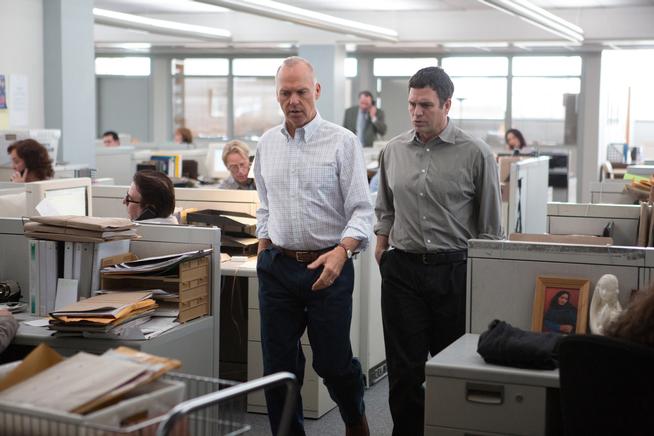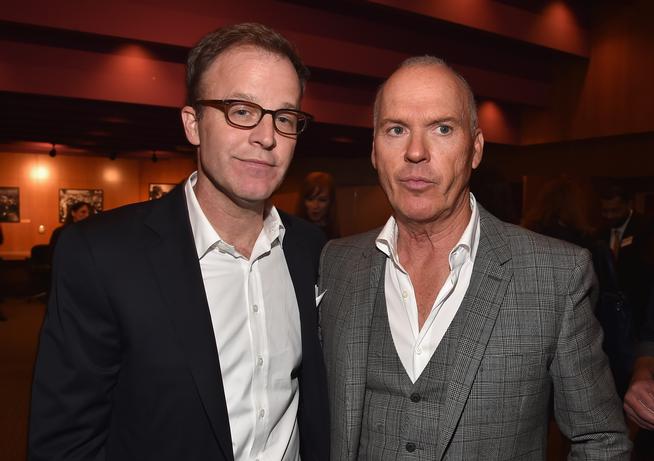"Spotlight" Methodical, Moving, Worthy of Best-picture Conversation
By Lisa Kennedy
"This work is essential to our democracy, to our nation, to our better selves," McCarthy said. "All big words and thoughts, but it's so true, so fundamental. I do think people appreciate it when they see it in practice." McCarthy has a well-grounded romantic streak about us humans. He burst gently onto the scene in 2003 when his charmer "The Station Agent" introduced indie audiences to the marvel that is Peter Dinklage long before "Game of Thrones" and also promised rich, palpable characters from the writer-director, who is also an actor. It has been a promise borne out in the films he has written, co-written, or written and directed — from Pixar's "Up" to "The Visitor" to "Win Win." "We bring slightly different things to the table," says "Spotlight" co-writer Singer. "Tom's character work is the best in the business and I like to think I picked up some of that watching him." Finding the structure The Los Angeles-based screenwriter got his start on television's "The West Wing" thanks to film director and TV show runner John Wells. For a spell, he also wrote for "Law & Order: Special Victims Unit." The Harvard Law School grad, who did a stint as a business analyst for McKinsey & Company, isn't a newbie to the demands of researching vast topics. His debut screenplay was "Fifth Estate," about Julian Assange and WikiLeaks. "I approach things from structure. 'What's the big picture?' It's all about inhaling a ton of information." "Spotlight" has loads of information, much of it heavy. The filmmakers tread a fine line in telling the story of journalists in pursuit of a big story while never manhandling the sexual abuse crimes at its core. It is chilling but also invigorating. The pain and outrage are never lost on the Spotlight team — or us. When "Spotlight" screened at the Toronto Film Festival, the six journalists and their big-screen avatars were together. "That was really special," says McCarthy. First, the director brought the actors on stage. As exciting as that is for audiences, that also tends to be business as usual at the Toronto fest, which is thick with talent running the media gauntlet ahead of fall releases. Then he called the reporters on stage. They were met with a prolonged standing ovation. "The reaction to them was as if I brought out astronauts," McCarthy recalls. "I've never seen six more awkward people on stage in my life. If you've ever been on that side of things, it's great, but there's really nowhere to put that energy. You gotta kind of sit there and take it. These reporters were not used to that. It was really, really lovely." Why the heroes' welcome? McCarthy has his theories. "I feel there's a real disconnect between people's understanding of the state of journalism today. Not only how essential it is to our society but where it's at, how it's functioning, how it should be functioning," he says. "Right now it's not the healthiest institution. And our democracy depends on it being a very healthy institution. "I think we need to collectively acknowledge that. I think, that night, the audience did acknowledge the sort of blue-collar, dedicated, relentless, for the most part anonymous work. How do we strengthen that right now? How do we re-create that in the 21st century?" "Spotlight" leaves us with that problem to address, as well as another, more wounding one. From the very beginning, the filmmakers were interested in the question of deference. After all, the Catholic Church's structure encourages, if not demands, it from its priests, its parishioners — but maybe the rest of us, too. "People know the church is not the greatest actor here," Singer said. "But few people think of how this was the collective failure of a community. How everyone is looking the wrong way or looking the other way. 'Did I miss this too?' That's the question we should all be asking."
|
.
Any original material on these pages is copyright © BishopAccountability.org 2004. Reproduce freely with attribution.

